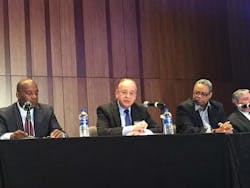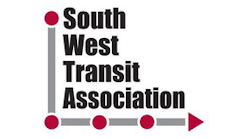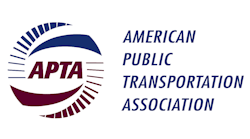The American Public Transportation Association’s annual Legislative Conference kicked off in Washington, D.C. Sunday, March 18, where many discussions focused on what the most critical issue facing the industry is: funding, financing and responding to emerging technologies being three of the top contenders.
With a diverse membership within the organization, both APTA President and CEO Paul Skoutelas, and APTA Chair and Jacksonville Transportation Authority CEO Nathaniel Ford Sr. said it all starts with bringing everyone together to speak with one voice.
Skoutelas said, “There’s nothing like a legislative conference forward because no matter what we do, it takes real money.” He added that with the broad cross section of members here, “That’s what it is going to take to make compelling messages that ring true. We need to be consistent, persevere to make sure people know what we stand for.”
Funding and Financing
Funding is always a primary conversation at the Legislative Conference and with the Administration’s recent budget proposal, the infrastructure initiative and mid-term elections coming up, funding was again key. A fundamental piece of that is the financing.
Discretionary program funds have come from the general fund and InfraStrategies LLC Managing Principal Sharon Greene said the industry needs to be careful about wanting more discretionary funds. With all of the tax cuts, the ability to get anything from the general fund is going to be more and more constrained as other programs are looking for more out of there, as well.
The advocacy strategy overview is to play both offense and defense in advocating for public transportation funding in an infrastructure initiative and in Congress appropriations. “This is a constantly moving flexible process that we’re in right now,” said Chicago Transit Authority President Dorval Carter Jr. “Making sure our voices are at the table and that we are prepared for any twists or turns that could happen.”
Responding to Emerging Technology
The evolving mobility paradigm is creating new opportunities and new challenges Federal Transit Administration Acting Administrator Jane Williams talked about mobility, not mode, and working together to move people as efficiently as possible.
Many attendees pointed out that the private industry is adapting and evolving very fast and transit needs to keep up.
Kristen Joyner, South West Transit Association executive director, said legislators are hearing from those representing transportation network companies and autonomous vehicles; “They have the ear of Capitol Hill right now.” She concluded that transit needs to be driving that conversation right now.
Part of the discussion needs to focus on legislation related to the new technologies. There needs to be guidance on how vehicles are supposed to connect, and to prioritize that when the private sector is looking to bring in mobility options, they need to work as a partner under the local transit system.





